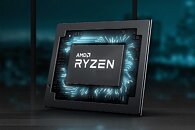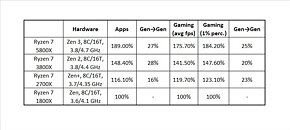Monday, December 21st 2020

The Ultimate Zen: AMD's Zen 3 Achieves 89% Higher Performance Than First-generation Zen
An investigative, generation-upon-generation review from golem.de paints an extremely impressive picture for AMD's efforts in iterating upon their original Zen architecture. While the first generation Zen achieved a sorely needed inflection point in the red team's efforts against arch-rival Intel and its stranglehold in the high-performance CPU market, AMD couldn't lose its vision on generational performance improvements on pain of being steamrolled (pun intended) by the blue giant's sheer scale and engineering prowess. However, perhaps this is one of those showcases of "small is nimble", and we're now watching Intel slowly changing its posture, crushed under its own weight, so as to offer actual competition to AMD's latest iteration of the Zen microarchitecture.
The golem.de review compares AMD's Zen, Zen+, Zen 2 and Zen 3 architectures, represented by the Ryzen 7 1800X, Ryzen 7 2700X, Ryzen 7 3800X and Ryzen 7 5800X CPUs. Through it, we see a generational performance increase that mostly exceeds the 20% performance points across every iteration of Zen when it comes to both gaming and general computing workloads. This generational improvement hits its (nowadays) most expressive result in that AMD's Ryzen 7 5800X manages to deliver 89% higher general computing, and 84% higher gaming performance than the company's Zen-based Ryzen 7 1800X. And this, of course, ignoring performance/watt improvements that turn the blue giant green with envy.
Sources:
Golem.de, via 3D Center, via Reddit user @ Voodoo2-SLi
The golem.de review compares AMD's Zen, Zen+, Zen 2 and Zen 3 architectures, represented by the Ryzen 7 1800X, Ryzen 7 2700X, Ryzen 7 3800X and Ryzen 7 5800X CPUs. Through it, we see a generational performance increase that mostly exceeds the 20% performance points across every iteration of Zen when it comes to both gaming and general computing workloads. This generational improvement hits its (nowadays) most expressive result in that AMD's Ryzen 7 5800X manages to deliver 89% higher general computing, and 84% higher gaming performance than the company's Zen-based Ryzen 7 1800X. And this, of course, ignoring performance/watt improvements that turn the blue giant green with envy.


42 Comments on The Ultimate Zen: AMD's Zen 3 Achieves 89% Higher Performance Than First-generation Zen
To be honest, optimization for something like Bulldozer or Piledriver was, well, stupid.
Times had changed, and now AMD sells more new CPUs (or one-before-new) than Intel does. Everything is optimized for both. The same set of tests, *if* the mentioned piece of software was still updated and optimized, will result in different numbers if repeated today.
Much the same goes for games, they are mostly NVIDIA-optimized at top level - which may change, too.
Apart from that, "final and deciding parameter" - of course, "the gaming crown" is such a ridiculous measurement - done at Ultra settings which serve for reducing speed and mostly nothing else and at the resolution which is already outdated, and does hundreds of FPS. Really useful.
Anyhow, regarding reality - things change, new firmwares, new drivers, new software optimization, Windows itself...
Zen+ was the one with good prices - 2700 ($299) and 2700X ($329).
Zen2 went backwards - 3700X ($329) and 3800X ($399).
Zen3 brought another price bump - 5800X ($449).
With clocks under load being somewhat variable and TDP a moving target, fixed-clock IPC tests paint a better picture of architectural progress. Sweclockers for example:
www.sweclockers.com/test/30758-amd-ryzen-7-5800x-och-ryzen-5-5600x/8What progress? End of 2018 brought 9900K and with little to no architectural changes 9900K/10700K are a pretty fixed target for most of this timeframe.
Amd is probably clinging to the fact that past gens Ryzen CPUs weren't good for gaming but this has improved for sure.
What makes Ryzen so great right now is that they have the performance advantage as well as the price advantage. This makes Ryzen an excellent value for a great many ATM. However, Intel still has the absolute performance crown because Core i9 & Xeon CPUs can OC like mad without a lot of fidgeting required, which is why i9 and Xeon CPU's are used by everyone for benchmarking and are still the preferred choice for gamers who can spend the money.
If you consider 1st gen Ryzen and 3000 series which in fact is a 2nd gen Ryzen, the increase in performance is substantial.
What I would like to know is, what's the difference at 1440p but preferably 4k for the Ryzen+ 2700x vs 5800x (if any noticeable) and how will it look like with future games. 1080p for me is too low of a resolution to be honest. I don't want to upgrade my 2700x if there will be no difference playing at 4k or 1440p. From what I see in the reviews of the 5800x the difference between 2700x and 5800x is like nothing. I seriously doubt that this will change in the near future but who knows.